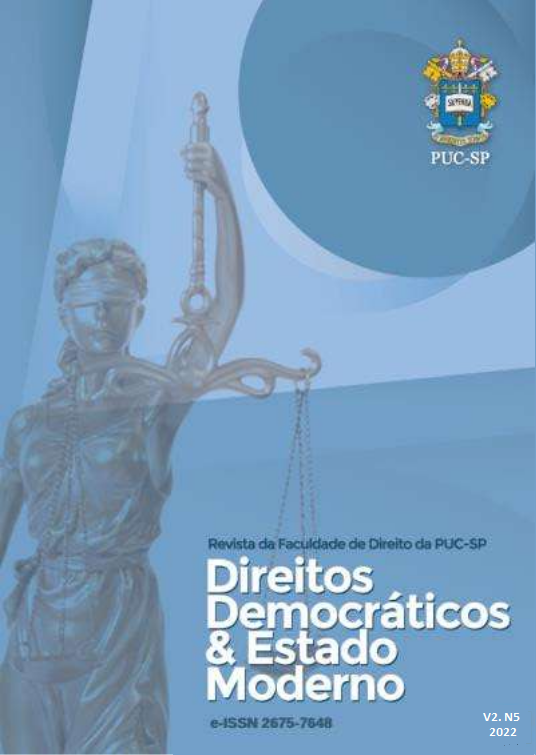O Acordo de Não Persecução Penal e sua aplicação no tempo aos casos anteriores a sua vigência
DOI:
https://doi.org/10.23925/ddem.v.2.n.5.57511Palavras-chave:
Lei processual mista, Retroatividade da Lei Penal mais benéfica, Acordo de Não Persecução Penal, Constitucionalidade, Sistema acusatórioResumo
O Acordo de não Persecução Penal (ANPP) é o mais novo instituto de justiça penal negociada a ser entabulado entre Ministério Público e indiciado. O ANPP é um mecanismo de promoção de política criminal desencarceradora, uma vez que sua aplicação se estende à maioria dos crimes previstos no Código Penal e legislação extravagante, trazendo como punição o cumprimento de obrigações diversas da privação de liberdade. Todavia, a sua aplicação ainda não é uniforme, pois a doutrina, assim como os tribunais superiores, ainda não pacificou a questão da retroatividade do acordo, por se tratar de lei processual mista com caráter mais benéfico aos acusados/réus. O objetivo do presente artigo é traçar um panorama geral sobre o instituto do ANPP estabelecendo conceituando os seguintes pontos: constitucionalidade, natureza jurídica, aplicação no tempo e a partir das premissas estabelecidas firmar os limites de alcance da referida norma, assim como conferir-lhe a interpretação mais justa e adequada tendo como parâmetro o sistema acusatório e as normas constitucionais que regem a matéria. A metodologia adotada é pesquisa bibliográfica, utilizando como método de estudo o hipotético logico-dedutivo. Nesse diapasão, o Acordo de Não Persecução Penal é entendido como um direito subjetivo do réu, oriundo de uma norma mista, processual e penal, que trata de direitos materiais como a extinção da punibilidade, devendo, portanto, retroagir para alcançar todos os casos anteriores a sua vigência, ressalvado o trânsito em julgado, conforme disciplina a Constituição Federal de 1988 em seu art. 5º inciso XL.
Referências
ABRACRIM. A ASSOCIAÇÃO BRASILEIRA DOS ADVOGADOS CRIMINALISTAS. AÇÃO DECLARATÓRIA DE INCONSTITUCIONALIDADE. 2020. Disponível em: https://redir.stf.jus.br/paginadorpub/paginador.jsp?docTP=TP&docID=751792146&prcID=5843708#. Acesso em 02 jul. 2021.
CAPEZ, Fernando. Curso de Direito Penal: Parte Geral. São Paulo: Saraiva Educação, 2020.
DOTTI, R. A. A Crise do Sistema Penal. Revista dos Tribunais, nº 768, out.1999.
GOMES, José Jairo. Acordo de não persecução penal e sua aplicação a processos em curso. 2020. Disponível em: http://genjuridico.com.br/2020/04/29/acordo-de-nao-persecucao-penal-processos/. Acesso em 02 jul. 2021.
GOMES, José Jairo. TEIXEIRA, Danielle Torres. Acordo de não persecução penal e sua aplicação a processos em curso. 2020. Disponível em: https://www.migalhas.com.br/depeso/325403/acordo-de-nao-persecucao-penal-e-sua-aplicacao-a-processos-em-curso. Acesso em 02 jul. 2021.
BRASIL. Congresso Nacional. Câmara dos Deputados. Comissão Parlamentar de Inquérito do Sistema Carcerário. Brasília: Câmara dos Deputados, Edições Câmara, 2009.
BRASIL. Dados sobre população carcerária do Brasil são atualizados. Governo do Brasil, 2020. Disponível em: https://www.gov.br/pt-br/noticias/justica-e-seguranca/2020/02/dados-sobre-populacao-carceraria-do-brasil-sao-atualizados. Acesso em 02 jul. 2021.
BRASIL. DECRETO-LEI No 2.848, DE 7 DE DEZEMBRO DE 1940. 2020. Disponível em: http://www.planalto.gov.br/ccivil_03/decreto-lei/del2848compilado.htm. Acesso em 02 jul. 2021.
BRASIL. DECRETO-LEI Nº 3.689, DE 3 DE OUTUBRO DE 1941. 2020. Disponível em: http://www.planalto.gov.br/ccivil_03/decreto-lei/del3689compilado.htm. Acesso em 02 jul. 2021.
DEZEM, Guilherme Madeira; SOUZA, Luciano Anderson de. Comentários ao pacote anticrime: Lei 13.964/2019. 2020. São Paulo: Revista dos Tribunais, 2020.
DPE. RELATÓRIO SOBRE OS DADOS COLHIDOS PELO PROJETO ASSISTÊNCIA LEGAL E VISITA VIRTUAL (JUL. 2019 A JUN. 2021). Disponível em: https://defensoria.ma.def.br/dpema/documentos/noticias/anexos/523eedc73c3e69a290d2efa6b30daba5.pdf. Acesso em 11 nov. 2021.
IPEA. Reincidência Criminal no Brasil: Relatório de Pesquisa. Rio de Janeiro: Livraria Ipea, 2015
LIMA, Renato Brasileiro. Manual de Processo Penal: volume único. Salvador: JusPodivm, 2020.
LOPES JUNIOR, Aury. Direito Processual Penal. São Paulo: Saraiva Educação, 2020.
LOPES JUNIOR, Aury. ROSA, Alexandre Morais da. Entenda o impacto do Juiz das Garantias no Processo Penal. 2019. https://www.conjur.com.br/2019-dez-27/limite-penal-entenda-impacto-juiz-garantias-processo-penal. Acesso em 02 ago. 2021.
LOPES JUNIOR, Aury. ROSA, Alexandre Morais da. Juiz das garantias e Direito intertemporal: onde a decisão do STF resvala. 2020. https://www.conjur.com.br/2020-jan-17/limite-penal-juiz-garantias-direito-intertemporal-onde-stf-resvala. Acesso em 02 ago. 2021.
PACELLI, Eugênio. Curso de Processo Penal. São Paulo: Atlas, 2020.
PIERANGELI, José Henrique; ZAFFARONI, Eugenio Raúl. Manual de Direito Penal Brasileiro: parte geral. 11. ed. São Paulo: Revista dos Tribunais, 2015.
PIERANGELI, José Henrique; ZAFFARONI, Eugenio Raúl. Manual de Direito Penal Brasileiro: Parte Geral. São Paulo: Thomson Reuters Brasil, 2021. E-book.
SANTOS, Marcos Paulo Dutra. Comentários ao pacote anticrime. 2020. São Paulo: Método, 2020.
SIMÕES, Nataly. Negros e periféricos são os mais afetados pelo aumento da população carcerária no Brasil. 2019. Disponível em: https://www.almapreta.com/editorias/realidade/negros-e-perifericos-sao-os-mais-afetados-pelo-aumento-da-populacao-carceraria-no-brasil. Acesso em 02 jul. 2021.
STF. Ação Direta de Incostitucionalidade nº 6304. 2019. Disponível em: http://portal.stf.jus.br/processos/detalhe.asp?incidente=5843708. Acesso em 02 jul. 2021.
STF. Habeas Corpus 185.913 Distrito Federal. 2020. Disponível em: http://portal.stf.jus.br/processos/detalhe.asp?incidente=5843708. Acesso em 09 nov. 2021.
Downloads
Publicado
Como Citar
Edição
Seção
Licença
Copyright (c) 2022 Direitos Democráticos & Estado Moderno

Este trabalho está licenciado sob uma licença Creative Commons Attribution 4.0 International License.

Este obra está licenciada com uma Licença Creative Commons Atribuição 4.0 Internacional.
Revista DD&EM - ISSN 2675-7648
















